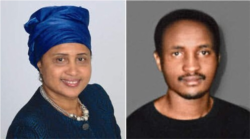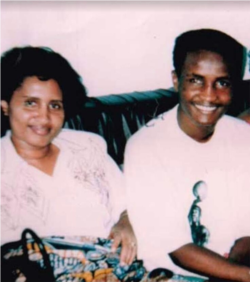It was the plaintive cry of George Floyd, captured on video as he was pinned to the ground with a police officer’s knee on his neck, that touched Kadiatou Diallo with its echoes of her own son’s untimely death.
“He was crying out for his mother," she said. “I heard him as the mother of Amadou Diallo. And all the mothers heard him.”
Twenty-one years before Floyd’s death May 25 in Minneapolis, Minnesota, four New York City police officers fired a hail of bullets at the younger Diallo in the dim vestibule of his Bronx apartment building. The officers later claimed they had mistaken the 23-year-old West African immigrant for a rape suspect and fired in self-defense when he pulled out a black object that they thought was a handgun. It was his wallet.
Waves of protest
The young Black man’s death on February 4, 1999, and the white officers’ acquittal of second-degree murder charges a year later, set off waves of protest. It brought his grieving mother from Guinea and ultimately turned the businesswoman into an activist for police reform, social justice and education.
“My son, my firstborn, Amadou Diallo, was gunned down for no reason,” the mother of three surviving grown children told VOA in a Skype interview this month.
Kadiatou Diallo described her son’s death, like Floyd’s, as “a defining moment in history.” She said it propelled people “of all races and creeds to march together and demand, ‘How can a human being be shot at 41 times?’ ” Nineteen of the bullets struck Diallo.
His was a high-profile case, with the officers’ trial documented on Court TV."The whole entire world watched it,” Kadiatou Diallo said.
Diallo was memorialized in a Bruce Springsteen song, "American Skin (41 Shots)." Netflix’s “Trial by Media” documentary series revisited the story in an episode released in May.
'I asked for calm'
When the verdict was announced in February 2000, Kadiatou Diallo leaned on her Muslim faith to address reporters.
“I asked for calm and prayers,” she recalled. “I said to them, ‘Violence should not cause more violence. Amadou has received so much violence.’ I just kept my head high, and I told the people that I will be fighting for equality, for justice, for life.”
Then, as now, Kadiatou Diallo has tried to find elements of good amid tragedy, to channel anguish and anger into constructive action.
After she and her ex-husband received a $3 million settlement from New York City for their son’s wrongful death, she co-wrote the memoir “My Heart Will Cross This Ocean.”
She started the Amadou Diallo Foundation, a New York nonprofit that promotes racial healing and higher education. It provides scholarships to New York City colleges for immigrants or students of African descent. It runs an education center in Guinea’s second-largest city, Labé. The foundation also aims “to bridge the divide between young people in the diaspora and young people in Africa,” she said.
Its website offers a rich portrait of Diallo. Katiadou Diallo said it was painful to hear her son described — in court and in many news accounts — solely as an immigrant street vendor.
He was educated, multilingual and well-traveled, having grown up in Liberia, Guinea, Togo and Thailand. He moved to the United States in September 1996. In their last phone call, Katiadou Diallo said, he announced he had saved $9,000 and would enroll in college. “I will make you proud,” he told his mother.
He was killed four days later.
Making an impact
Diallo’s killing focused attention on the New York Police Department’s Street Crimes Unit, to which the four officers belonged. The elite unit was disbanded in 2002 amid a federal investigation into alleged civil rights violations and racial profiling.
Meanwhile, Kadiatou Diallo continues to push for change — in part through the Justice Committee, a grassroots New York organization that opposes police violence and aims to empower people of color.
It is part of a coalition whose efforts led New York Governor Andrew Cuomo to approve this month a package of police reforms that include banning chokeholds and allowing transparency of disciplinary records.
The Justice Committee’s June 14 open letter to Cuomo scolded him for taking credit for reforms “us families helped to champion in the past years,” and accused him of impeding progress. Diallo’s name is the first of 18 listed as signatories.
The Amadou Diallo Foundation’s outreach extends to the police. One of its board members is Graham Weatherspoon, who is retired from the NYPD.
Prospects for change
In the response to Floyd’s recent death and those of other African Americans, Kadiatou Diallo sees broad new momentum in addressing racial inequality.
“I believe my son opened the door then, 21 years ago,” to scrutiny of police brutality and racial disparities, she said. “The difference today is social media” and amateur video, “so that the world can see the way George Floyd was killed. Can you believe if we don't have that tape? What would have been the story?”
She continued, “This very, very big outpouring [of] voices, these young people who are locking hands and marching, protesting and demanding, saying that Black lives matter, all lives matter — this is something that even big corporations are not ignoring today.
“We must find solutions — long-lasting solutions — to solve this problem” of inequality, she said. “Otherwise, I don't know where we go from here.”






